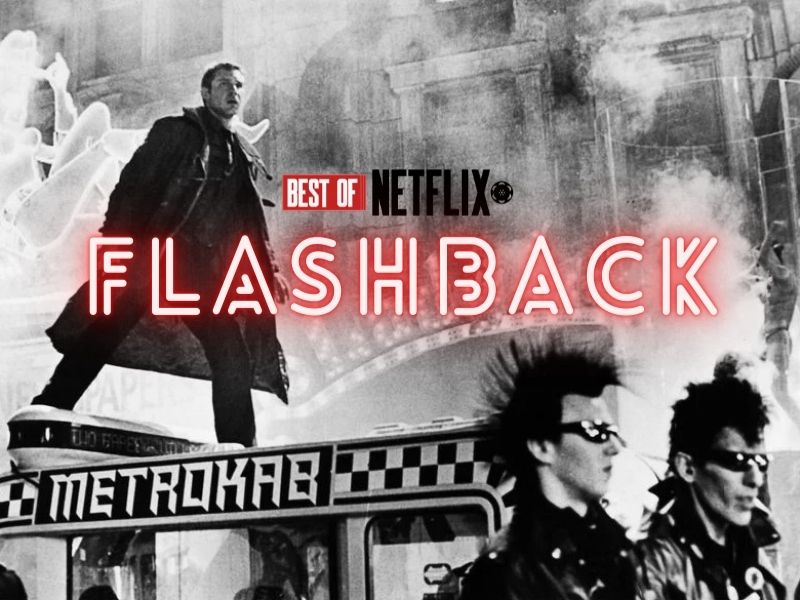As Netflix is continuously piling its figurative shelves with reams of original projects, it’s worth reminding ourselves that they started out by sharing some of the greatest Hollywood titles ever made. So, with Netflix Flashback, we’re looking back at some of the platform’s classic films and reminding ourselves just how great they are. Next up, is the utterly fantastic post-human, the dystopian masterpiece from Ridley Scott, Blade Runner.
In Philip K. Dick’s endlessly imaginative vision of the future, human society had figured out flying cars, interplanetary colonialism, revolutionary bioengineering and much more by 2019. It is 2022 now and although we still haven’t convinced significant portions of the population that the earth isn’t flat, we are slowly getting closer to Dick’s dystopia. Almost four decades later, does Blade Runner still retain its revelatory magic?
Despite being an adaptation of Dick’s seminal sci-fi novel Do Androids Dream of Electric Sheep?, the film is a separate entity altogether. In the book, Dick explores a possible future of our civilisation where we have conquered other planets through neo-colonial practices and left the unwanted back on Earth – a dying world. Do Androids Dream of Electric Sheep? is an essential work of existentialism because it examines such deep themes through an intimate lens, focusing on the perspective of a bounty hunter who tries to search for subjectivity by pursuing the purchase of a real goat in a universe that is abundant with copies of copies of copies ad absurdum.
Blade Runner does away with these introspective investigations and lets the terrifying beauty of a dystopian Los Angeles wash over the audience. Jordan Cronenweth’s use of chiaroscuros and neon compositions in his mesmerising cinematography transform Blade Runner into a transcendental neo-noir experience, painting the intricacies of a vast world one scene at a time. Starring Harrison Ford as a bounty hunter named Rick Deckard, Blade Runner raises questions about post-humanism, ethics, violence and love by following a simple “search and destroy” mission. At the centre of these tangential lines of thought is a quite profound question: what does it mean to be human?
In Deckard’s world, the Tyrell Corporation – a leviathan of modern technology manufactures bioengineered organisms that are physically identical to humans but have superior characteristics like amplified strength and intelligence. Dick referred to them as androids but Scott chose to use “replicant” since he wanted the audience to consider them as something new instead of building on existing models. To ensure that these highly competent replicants do not develop the emotional capacities of humans, they are given a lifespan of just four years. Replicants are treated as commodities designed for human indulgences such as war and pleasure; their deaths are labelled with the trivial term “retirements”.
Scott’s film is a flawed masterpiece because, for the most part, it is obsessed with the spectacle of Dick’s imagination rather than the depth of his philosophical concerns. To be fair, the brilliant production design is an essential part of Blade Runner’s moody atmosphere which proves to be conducive to multiplicities of interpretations in the minds of the audience. Within that aesthetic framework, we are forced to confront our historical as well as future tendencies to annihilate the Other. If replicants are the next step in the evolutionary ladder, humanity has to accept its looming obsolescence but it chooses to create unnecessary distinctions like “empathy tests” to preserve the status quo. If empathy is the key to being human, a lot of human beings would not qualify.
After being forced to hunt down a group of replicants, we see observable transformations in Deckard’s beliefs as well. He starts to recognise that the “humanoids” he hunts down are alive just like he is and even ends up falling in love with one. Blade Runner’s most interesting investigations revolve around a replicant Roy Batty (played by Rutger Hauer). Driven by the Oedipal complex, he murders the head of the Tyrell corporation in a remarkable Freudian encounter with his “father”. By doing so, he fulfils the company’s motto of producing replicants that are “more human than human”. His partner Pris (Daryl Hannah) insists that replicants have their own identity despite being programmed because they are sentience, following the ratiocination of philosophers like Descartes. In the final showdown with Decker, Roy imitates animal noises to allude to the primitive nature of the human capacity for violence and his moving monologue is a powerful lamentation about the tyranny of his creators.
In a 1982 interview, Scott predicted: “I think various groups are developing today – faction groups which are religious, social, whatever – and Punk, if you really trace it back, probably emerged from some louts, ‘bovver boys’ as we used to call them, who developed their own little culture of protest. They probably stem from Manchester or Birmingham. And they decided out of sheer aggression to shave their heads. What could happen in the next 40 years is that various of these groups will stick. And they will harden up, so that there will be religious, political, social, and just nut-case factions. And I think the police force will become a kind of paramilitary, which they nearly are now. We’re just one step away.”
The filmmaker’s anticipations are not far off by any means. We have been observing a rigid stratification of ideological groups who have retreated to the comfort of their own echo chambers. If Blade Runner’s fiction ends up becoming our reality, it would be wise to pay attention to Philip K. Dick’s cautionary prophecies.
